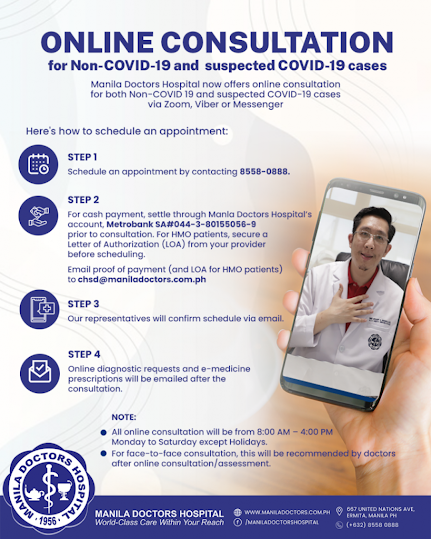Medical Teleconsultation: The Future of Healthcare
In recent years, medical teleconsultation has gained
increasing popularity and has become an integral part of healthcare systems.
With the advancement in technology, it has become easier than ever for
healthcare providers to communicate with patients remotely, without the need
for a physical visit to a healthcare facility. Medical teleconsultation has
proven to be beneficial in several ways, from improving patient access to
healthcare to reducing healthcare costs. In this article, we will explore the
concept of medical teleconsultation in detail and discuss its benefits and
challenges.
What is Medical
Teleconsultation?
Medical teleconsultation, also known as telemedicine or
virtual care, refers to the provision of healthcare services remotely, using
telecommunication and digital technologies. It involves the use of video,
audio, and other communication tools to connect healthcare providers with
patients, allowing them to consult and diagnose health conditions remotely.
Medical teleconsultation can be conducted through various mediums, such as phone
calls, video conferences, and messaging apps.
Medical teleconsultation, also known as telemedicine, is the
provision of healthcare services through the use of telecommunication and
digital technologies. It allows healthcare providers to remotely diagnose and
treat patients without the need for in-person visits. This technology has
become increasingly popular in recent years due to its convenience,
accessibility, and cost-effectiveness.
Benefits of Medical
Teleconsultation
One of the key benefits of medical teleconsultation is that
it allows patients to receive medical attention without having to travel to a
medical facility. This is especially beneficial for patients who live in remote
or underserved areas, have mobility issues, or simply prefer the convenience of
virtual consultations. It also allows healthcare providers to reach a larger
number of patients, which can be especially beneficial in areas where there is
a shortage of medical professionals.
Challenges of Medical
Teleconsultation
One of the main challenges of medical teleconsultation is
ensuring the security and privacy of patient data. Healthcare providers must
adhere to strict regulations and standards to ensure that patient information
is kept confidential and secure. Additionally, not all patients have access to
the technology needed to participate in teleconsultations, such as reliable
internet connections or compatible devices.
Future of Medical
Teleconsultation
Despite the challenges, medical teleconsultation is expected
to continue to grow in popularity in the coming years. The COVID-19 pandemic
has accelerated the adoption of this technology as patients and healthcare
providers alike seek to minimize the risk of infection. Additionally, advances
in digital technologies such as artificial intelligence and virtual reality may
further enhance the capabilities of medical teleconsultation and improve
patient outcomes.
Benefits of Medical
Teleconsultation
Improved Patient Access
to Healthcare
Medical teleconsultation has proven to be a game-changer in
improving patient access to healthcare. It enables patients to receive
healthcare services remotely, without the need to travel to healthcare
facilities. This is particularly beneficial for patients who live in remote
areas, have mobility issues, or have limited access to healthcare facilities.
Reduced Healthcare
Costs
Medical teleconsultation can significantly reduce healthcare
costs, both for patients and healthcare providers. By eliminating the need for
physical visits, it reduces transportation costs and saves time. It also helps
in reducing healthcare costs for healthcare providers by reducing the need for
physical infrastructure and staff.
Increased Efficiency
and Productivity
Medical teleconsultation has the potential to increase
efficiency and productivity in healthcare systems. By enabling healthcare
providers to consult with patients remotely, it reduces the waiting time and
enables providers to attend to more patients in less time.
My Brazilian Doctor is an excellent example of this,
offering telemedicine services to patients in Brazil and beyond. However, it is
important to note that online consultations may not be suitable for all medical
conditions, and in-person visits may still be necessary for certain cases.
A Family Physician, hailing from Brazil, who immigrated to
the UK, conceptualized My Brazilian Doctor, with over 20
years of extensive global experience. They are aware of the perils of falling
ill in a foreign land!
Their enterprise's roots are firmly entrenched in Brazil,
given that their professional accreditations, accounting, and tax documents all
originate from there. Nevertheless, My Brazilian Doctor is inextricably linked
to multinational conglomerates and nurtured as a ground-breaking enterprise at
Health Foundry, UK. They benefit from global best practices, mentoring, and
recommendations.
It is always best to consult with your doctor to determine
the best course of action for your specific healthcare needs.
Challenges of Medical
Teleconsultation
Technological
Challenges
Medical teleconsultation heavily relies on technology, which
can pose several challenges. Technical glitches, such as poor network
connectivity or device malfunctions, can disrupt the consultation, leading to
delays and reduced quality of care.
Legal and Regulatory
Challenges
Medical teleconsultation is subject to legal and regulatory
challenges, which can vary from country to country. It is important to ensure
that teleconsultation complies with the legal and regulatory framework of the
country where the patient is located.
Quality of Care
Ensuring the quality of care in medical teleconsultation is
a significant challenge. It requires healthcare providers to be adequately
trained in teleconsultation, have access to the necessary equipment and
infrastructure, and follow best practices in teleconsultation.
Future of Medical
Teleconsultation
Medical teleconsultation is here to stay and is expected to
play a significant role in the future of healthcare. With the advancement in
technology and the increasing adoption of teleconsultation by healthcare
providers and patients, it is expected to become an integral part of healthcare
systems worldwide.
Conclusion
Medical teleconsultation has revolutionized the healthcare
industry by enabling remote provision of healthcare services. It has several
benefits, including improved patient access to healthcare, reduced healthcare
costs, and increased efficiency and productivity.
However, it also poses several challenges, including technological, legal, and regulatory challenges, and ensuring quality of care. Despite these challenges, medical teleconsultation is here to stay and is expected to play a significant role in the future of healthcare. For further information click here

Comments
Post a Comment